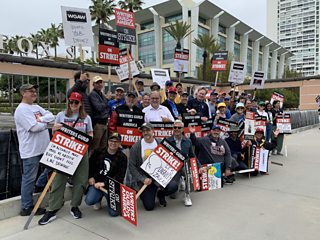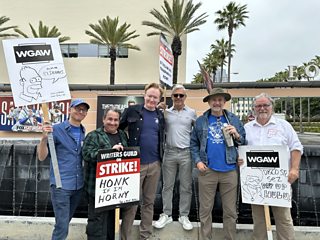In our WRITING TODAY series of blog posts we throw open the doors of the ±«Óãtv Writersroom blog and ask writers to tell us about the issues which are affecting the industry from their perspective.
In the latest WRITING TODAY blog post Josh Weinstein, who has worked in both the US and UK systems on shows including The Simpsons, Futurama, Strange Hill High and Danger Mouse, explains the background to the current Writers' Guild of America writers' strike, from his perspective.
The views expressed in the blog post are the author's personal opinion.
Writers have never had it so bad. And that's after 100 years of having to fight for protections, compensation and credit that should've been given in the first place.
Think about it: the was formed in 1920 to Hollywood was still in its infancy and already writers were getting screwed. Writers were forced to raise their collective voices before you could even hear people talk on screen.
You know the but he's still standing there, unharmed? Think of that as a metaphor for the writer in Hollywood who has union protection. Except that every block the writer walks, there's another facade falling. On every sidewalk.
Which brings us to the WGA strike of 2023.

Past and present writers of The Simpsons who attended the picket
The sidewalks now have 11,500 WGA writers joined by the 160,000 actors in , marching, carrying signs and pushing the occasional striking baby and/or dog in a pram (Obviously, not every member is out picketing every day, but look at the photos outside studios, corporate headquarters and filming locations in LA and NY, it's a massive turnout and growing each day. )
Writers and actors have a lot of complaints in common, as do many Americans and people around the world who are feeling the horrible squeeze of the Gig Economy and the general unpleasantness wrought by the Silicon Valley way of thinking (Remember when we were all inspired by it?)
When began about 15 years ago, we were optimistic. The promises of creative freedom and additional venues for creativity felt real. But like any new technology that requires a pipeline of art (and craft) to supply it, the people creating that flow needed to be paid and protected. Hence, the last , which was largely about making sure we got residuals and minimums from those nascent streaming services, just like we earned from the networks in the .
Writing a script is the same amount of hard work whether it's for a network or a streaming service. Yet, a script for a streamer earns a fraction of the residuals the same script would earn for a network or even basic cable. That needs to change.
Scripts and writers are the foundation shows and films are built upon - and are often the creative spark that brings it to life and keeps it alive - and writers should be rewarded in success. BTW, residuals are but a tiny percentage of the zillions a company earns from any successful project. In fact, if the WGA got everything we're asking for, it would only cost the studios/streamers 2% of the profits they make off our writing and work ().
In the past, if you worked hard - and had some luck and a good spec script - you could actually get hired on a staff and have a nice middle class life as a writer in LA or NY. In the 90's, I remember how if you got a writing job on a TV show, there were certain things you could count on: you would be on staff for the life of the show and because of that, not only would you be getting a regular salary, you'd have the opportunities to learn everything you needed to know about making a show and maybe even someday running one; if the show went to multiple seasons, you'd get promoted each year, all the while gaining more responsibility and more valuable skills; Writing a script - and rewriting it as a group - was just one part of a rewarding TV writing career. And you'd get decent residuals for the episodes you wrote.
Now much of that has been taken away, especially the word "career".
Gradually but radically the studio system has been reframed into a gig economy where job security is never guaranteed. Where instead of being on a show for its entire run, you're lucky if you get hired for a 10 week mini-room where the studio insists you work out the entire season in those short weeks then boom, you're kicked out, time to find another job. Oftentimes, the showrunner is left to make the show with either a fraction of the writing staff or no staff at all. The idea of being able to rewrite an episode with a staff of writers during production? When you actually see a scene on its feet with real actors and realize changes need to be made right then? A proven way that worked well since, well, pretty much the beginning of television? Forget it. (The show is a good example of the rare show that was able to fight this - creator and showrunner insisted he have his staff for the entire production and you can see the difference that made.)
And speaking of Succession, this is all happening at a time when there has never been more great television and the community of television writers has never been more wonderfully diverse. This should be an era that feels incredibly promising, where all sorts of tired creative boundaries are being broken and the fusion of art and commerce is working symbiotically to improve everyone's lives and everyone wins.
But - cue hacky 80's RECORD SCRATCH - along comes corporate greed, whispering in CEOs' ears. Psst, if you kill a show after its successful third season, not only can you save a ton of money, those annoying actors can't renegotiate for higher salaries. And if you pull it entirely from your service, you won't have to pay them or those pesky writers ANY residuals. And that movie or TV series you sunk millions into? Well, pull it before it's even released and take a big tax write off. It's the short term bottom line that matters.
(Sorry about the attempt at satire here. It could use a rewrite but I'm on strike so that's all you're getting in terms of entertainment. I'll try to toss in some Simpsons references later.)
What's particularly scary about all these useful things being taken away - just to satisfy the short term bottom line - is it hits younger writers - those just starting out in the profession - the hardest. They're the future of this industry but the CEO's and their lawyers and accountants don't seem to care. I have a feeling a lot of mid-level executives care but they're increasingly powerless. More and more people in Hollywood are powerless and the frustration is beginning to bubble over.
There are now endless levels of approval, an infinite series of hoops writers must jump through before they ever get paid. Even Buster Keaton would get exhausted by this and jump on the first train out of here. Well, the very front of the first train out of here, .
That's another complaint - it used to be (and I'm talking about the early 2000's, not the 1900's) you could have an idea, flesh it out in a month, go in to a network, pitch it and they might actually buy it in the room. Or you'd pitch it to a studio, they'd buy it and pay you to develop it. Now you have to spend a year developing it, find actors/studios/whatever to attach to it, go through endless rounds of notes from the studio that is supposedly there to "help" you before you can even pitch it. And all FOR FREE. And don't get me started on Pitch Decks, which no one seemed to need for, oh, let's say the entire first 100 years of the entertainment industry.
The idea that writers must do so much for free while the people they're doing it for are getting paid is, to put it mildly, extremely infuriating. Meanwhile, the writers who are getting paid to be on staff find their salaries getting stretched thinner and thinner. How can this all be happening in a prosperous time for the industry, one with "peak TV"? I won't go into the complexities of "Span Protection" but it's another incredibly important issue. I'll just tell you the following sobering fact: Ten years ago, 33% of working TV writers were earning WGA minimum. That's what you're supposed to get when you're starting out. Now that number has ballooned up to 49%, including many showrunners (). Not much incentive in that. And for film writers, it's even worse. Their median pay hasn't increased since 2018 and they, too, are facing increased demands to do free work. And comedy variety writers? They don't even have a minimum if they're writing for a streaming service.
Well, Buster Keaton didn't let buildings fall on him for free and neither do I.

Pictured from left to right are Futurama co-creator and showrunner David Cohen, Josh Weinstein, Conan O'Brien, Family Guy showrunner Rich Appel, King of the Hill, American the Office and Parks and Recreation co-creator and showrunner Greg Daniels, and Matt Groening.
If you think I'm bringing up the past so much, there's a reason (and not just 'cause I'm a former Simpsons writer who loves oldtimeyness. ) The CEO's and the (Alliance of Motion Picture and Television Producers) are acting like oldtime movie villains. And not the sophisticated-though-flawed type CEO. I'm talking the old moustache twirling, tie-you-to-the-railroad-tracks villain. If you wrote the villainy that's taking place in Hollywood today into a script, it would be rightfully noted as too over-the-top and contrived. Yet here we are. But this time, thanks to the very internet I decry, the whole world is on to their shortsighted, unmotivated, out-of-touch, laughable-if-it-weren't-hurting-so-many-people cruelty. When a CEO made nearly half a billion dollars over four years yet a writer for the hit show, The Bear, couldn't even afford to pay their rent, there's something horribly wrong.
So there you have it. As the world of streaming expanded, the life - and quality of life - of the working writer in Hollywood contracted drastically. To the point where many writers literally cannot make a living writing or even dare dream of it.
And if there aren't real people writing those words to give us hope, to make us laugh, to make us cry, to make us jump out of our seats with a really brilliant fright - if it's only AI generating those scripts and faces on screen, well, then, we've lost two important things. The Entertainment Business. And our Humanity.
That's why we're striking. And that's why so many hard working people from other professions - the Teamsters, the hotel workers and more - are joining our pickets and we, theirs. Everyone's feeling the pinch. It's time to pinch back.
So until it's resolved, I'll be picketing at the Fox lot, by the Galaxy Gate, where I used to drive in when I worked on the Simpsons and seemed like just a funny cartoon character.
There's your Simpsons reference.
For more background to the 2023 WGA writers' strike visit the ±«Óãtv News website:
Read more Hollywood news stories on the ±«Óãtv News website
- including details of the writing process and his reaction to the strike
- read his blog post
Watch an interview with Josh Weinstein on the ±«Óãtv Writersroom website
